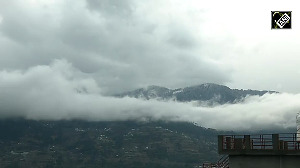Some experts in India's thriving advertising industry are sceptical about whether the Board of Control for Cricket in India's multi-million dollar Twenty20 league will be an unqualified financial success.
The officially sanctioned Indian Premier League (IPL) is expected to showcase many of the sport's global big names, including Australia's Shane Warne.
The venture starts on April 18 and will be played over 44 days in eight cities with 59 matches aimed at prime-time television for Indian audiences.
More than 80 international cricketers are expected to feature in a players' "auction" in Mumbai on Wednesday with each of the eight franchises having a cap of $5 million for a maximum of eight players each.
However, some experts from the advertising field say the IPL will remain a domestic tournament despite its foreign input and new city-based franchise format and that there are not many takers for the domestic game.
Indian advertising guru Prahlad Kakkar said: "The Twenty20 format is exciting and a new generation will grow on it, but the Ranji Trophy, with its share of international players for their respective states, does not have any following."
The Ranji Trophy, India's premier first-class domestic championship, is usually played to a handful of spectators and a negligible television audience.
The Twenty20 format caught the imagination of India, a country of 1.1 billion with the largest global cricket audience and multi-million dollar deals, after their young team emerged surprise winners at the inaugural World Cup last year.
The victory parade for captain Mahendra Dhoni's team in Mumbai brought the financial capital to a standstill.
PASSIONATE FOLLOWING
But Kakkar said such passionate following applied only when the Indian national team was in action.
"I don't think many Indians sit in front of the television when two other countries are playing," said Kakkar. "And what about the ICL? It also had several international players, but I don't think it was successful."
The Indian Cricket League (ICL), bankrolled by Essel Group, which controls Zee Telefilms, India's largest listed media firm, launched their unofficial Twenty20 tournament last year but received a lukewarm response.
They had several international players in their ranks, the biggest being West Indies great Brian Lara and former Pakistan captain Inzamam-ul-Haq.
The IPL, seen as the Indian board's counter to the ICL, has gained tremendous momentum as organisers lure top international players with hefty pay cheques.
The international cricket community is even asking the game's governing ICC to set aside a clear slot for the league in the next Future Tours Programme to avoid a clash of interest for players on national duty.
IPL's eight franchises were sold to companies and consortia for over $700 million last month after the base price for owning a team for a 10-year period was set at $50 million.
The Mumbai franchise fetched the highest at $111.9 million and was bought by the country's most valuable company, Reliance Industries.
Top Bollywood names Shah Rukh Khan and Preity Zinta are among the owners of the franchises, adding further glamour.
RIGHTS SALES
Last month organisers also announced a 10-year rights contract worth more than $1 billion, with TV rights at $918 million and another $100 million for the league's promotion.
In addition, organisers clinched a five-year title sponsorship rights deal worth $50.3 million.
But while the Indian advertising industry sees IPL as a potential vehicle in a retail booming Indian economy, they are unsure if it can match early expectations.
M K Machaiah of Mindshare, which deals with media buying and planning, says the product has been overpriced as it is yet to establish itself. "Currently the broadcasters have placed the rate at Rs 2.25 lakh ($5,672) per 10 seconds slot, which was the rate sold during the Twenty20 World Cup," Machaiah said.
But with corporate involvement on the rise in Indian cricket, some are more confident.
"Lalit Modi [the IPL chairman] has marketed it really well. People will not be putting money in it without understanding its potential," T A Sekhar, sports administration vice-president of infrastructure company GMR Holdings, the owner of Delhi franchise, said.
"Over $1 billion as broadcast rights are figures that match that of the World Cup. The format is such that it also involves promising domestic youngsters. I think the balance sits well. I'm confident of its success."








 © 2025
© 2025